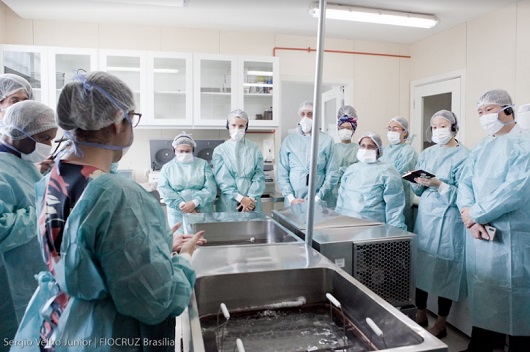BRICS sign cooperation with Global Network of Human Milk Bank
15/10/2019
Nathállia Gameiro (Fiocruz Brasília)
The 1st Brics Workshop on Human Milk Bank, held in Brasilia from August 28th to August 30th, resulted in the construction of an international agenda and a commitment signature to mobilize efforts to expand and share knowledge and technologies focused on food and neonata nutritional safety; and childhood care, with the right to health as its central value. The action will be coordenated and it will have as reference, the Fiocruz Brazilian Human Milk Bank Network (rBLH-BR) The workshop was part of Fiocruz's 120th anniversary celebrations.

Fiocruz's Brazilian Network of Human Milk Banks (rBLH-BR) will be a reference (photo: Sergio Velho Junior, Fiocruz Brasília)
The document was taken to the meeting of BRICS ministers, held in October, where they have confirmed the partnership. Together, Brazil, Russia, India, China and South Africa represent 42% of the world population, that will benefit from an important strategy for reducing infant deaths.
Brasília is an example for Brazil and for the world. The federal capital was chosen to host the event because it is the only self-sufficient city in human milk banks in the world, able to offer human milk to 100% of newborns admitted to intensive and semi-intensive neonatal therapy units. The city will receive a pilot study from the first Human Milk Bank Network Collaborating Center. “Nothing better than an event of this level and size to show what we really expect. The workshop marks the importance that Fiocruz Brasilia represents in this process, here it is as a technology diffuser pole”, said the coordinator of the Global Network of Human Milk Bank and researcher of Fiocruz, João Aprigio.
According to him, the event was an important milestone in the global health perspective and exceeded its goals. “We realize that the representatives of research institutions that have been here, place great confidence and hope in our cooperation as an important strategy to help them overcome difficulties and problems they have in this important and overlooked area of food security, and nutritional care in neonatal care,” he explained. He said Fiocruz has contributed to this area in Brazil and elsewhere in Latin America, the Hispanic Caribbean, the Iberian Peninsula, Africa, and now with the BRICS. “They need us and we need them, these countries have a lot to offer, with a millennial culture from the perspective of functional foods. And we have already worked on breast milk as a functional food. It will be a future action with many benefits for all of us.” Aprigio said that now begins a new phase, with a new management model, greater regionalization and reimbursement and integration of new regional units.
To Miriam Santos, Coordinator of Breastfeeding Policies and the Secretary of Health of the Human Milk Bank, the Collaborating Center is what it was missing in Brasilia because much milk is collected and distributed and many women are cared for, but there are no published studies on this work. “The expectation is to qualify in scientific form. We already have a good management of the network and now we need to put it on paper even as a model for other people. Let us be an example of how we can work on breastfeeding and how to collect human milk so that our children have better health and from there we will have better adults, less burden on the health system,” he said.
Brics representatives were able to get to know the collection, pasteurization and storage experience at the Human Milk Bank of the Taguatinga Regional Hospital, which has been in existence for 41 years and was the first in the Federal District (DF) and the fifth in Brazil for collection, pasteurization and storage.




